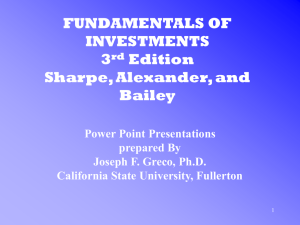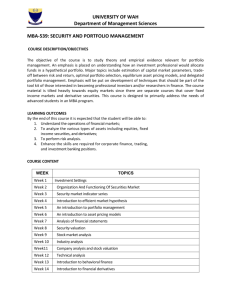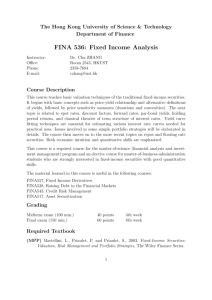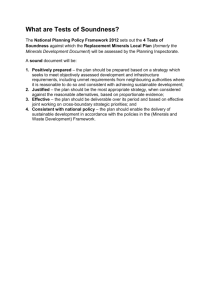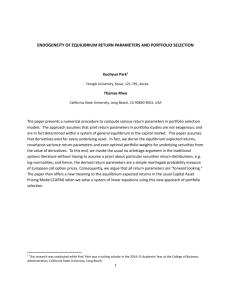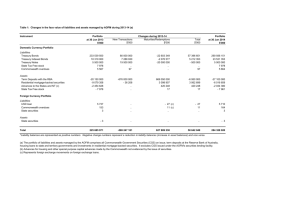Boston Common Shareholder Engagement Overview - 9-14
advertisement
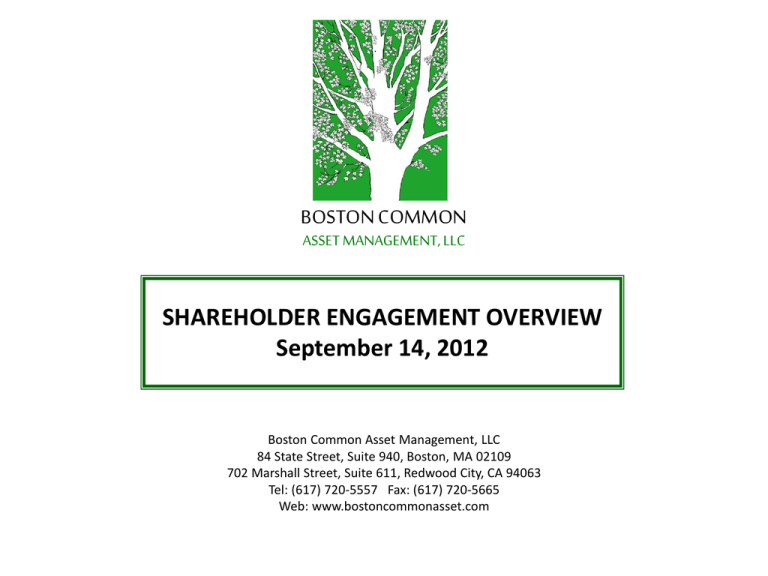
BOSTON COMMON ASSET MANAGEMENT, LLC SHAREHOLDER ENGAGEMENT OVERVIEW September 14, 2012 Boston Common Asset Management, LLC 84 State Street, Suite 940, Boston, MA 02109 702 Marshall Street, Suite 611, Redwood City, CA 94063 Tel: (617) 720-5557 Fax: (617) 720-5665 Web: www.bostoncommonasset.com Boston Common Asset Management Firm Overview • Specialty firm focused on environmental, social, and governance (ESG) integrated investing • U.S. and international long-only equity investing • Fundamental judgment, thorough research, active ownership • Over $1.6 billion in assets under management as of 3/31/12 (including subadvised assets) • Employee-owned firm founded by a seasoned team • Commitment to responsible practices 2 Shareholder Engagement Planning Focus • Key Inputs – Is it a key ESG Risk/Opportunity? – Is their client interest/involvement? – Can we have an impact? • Strategic Issue Areas – Corporate Governance/ESG Disclosure – Environmental Risk Management/Climate Change – Global Health – Human Rights • Coalitions – CERES, Interfaith Center on Corporate Responsibility, USSIF, UN PRI ESG Initiatives Beyond Research Dialogue Testimony Public Policy Testimony Proxy Voting Proxy Promote Sustainable & Improve Performance Growth, Transparency Promote Growth & Accountability International Collaboration International Collaberation TargetedData DataGathering Gathering Targeted Resolutions & Annual Meetings Global Drivers for Change: Human Rights • Regulatory Reform – US Dodd-Frank-Act Conflict Minerals Disclosure (Section 1502): – CA Transparency in Supply Chain Act (SB 657) • NGO Campaigns: Enough Project (Japanese electronics), London Olympics (corporate sponsors), Slavery Footprint (consumer tool) • Guiding Principles on Business and Human Rights: Implementing the United Nations “Protect, Respect and Remedy Framework” • OECD Due Diligence Guidelines for Responsible Supply Chains of Minerals in Conflict-Affected and High Risk Areas (3Ts in 2010 and gold supplement Feb 2012) Role of Investors • Investor Statements (EMDP, Conflict Minerals, Human Trafficking and Modern Day Slavery) • Global and Regional Peer Comparison – Using Global Peers with Advanced Companies (European and US peers with Global Players) – Using Regional Peers with Intermediate Companies (within Korea and Japan) • Raising the Benchmark on Investor Expectations (Beyond Compliance (Li & Fung), Anticipating Regulatory Reform (CA Transparency in Supply Chain Act) • Encourage Multi-Stakeholder and Industry Participation (EICC-GeSI, OECD, PPA, GNI) California Transparency in Supply Chain Act • Companies required to publicly disclose by January 1st 2012 how they are approaching human trafficking and modern day slavery in their supply chains – US, European and Asian companies impacted (retailers and manufacturers) – Audit Approach: Assessment, training, auditing, and disclosure • Engagement Examples – ICCR Human Trafficking Investor Statement sent to 27 global companies (June – December 2011) – Engaging Disney on human rights due diligence process – Met with Tesco to encourage the company to address human trafficking & modern day slavery in its own human rights policy (outside of CA subsidiary) – Encouraged Esprit Holdings to provide robust disclosure under CA Transparency in Supply Chain Act – In March met with Samsung to provide feedback on the level of disclosure they should make. Company published human trafficking statement in May. The information in this document should not be considered a recommendation to buy or sell any security. There is no assurance that any securities discussed in this report will remain in an account’s portfolio at the time you receive this document. The securities discussed do not represent an account’s entire portfolio and may represent only a small portion of an account’s holdings. It should not be assumed that any securities transactions we discuss were or will prove to be profitable. Past performance does not guarantee future results. All investments involve risk, including the risk of losing principal. Sector Exposure of Conflict Minerals Overall Usage of the 3 Ts and Gold Tantalum (Ta) Tin (Sn) Electrical Non Electrical Tungsten (W) Gold (Au) 9% 40% 60% 64% Predominant industry = Electronics • • • 30% 36% 70% 91% Predominant industry = Jewelry Diversified across industries, “hard metals” These metals are used widely in electrical products (including automobiles and appliances) Phase-out / substitution of some of these metals is not currently cost effective, or technically feasible The amount of these metals used in a typical electronic product are in the order of about 0.7 grams for tantalum, 10 grams for tin, 0.0001 grams for tungsten, and 0.3 grams for gold Source: 8 2012 Shareholder Engagement Highlights Conflict Minerals and Korea Hyundai Motors, Samsung Electronics, SK Telecom (Hynix) • Lauren Compere represented Boston Common as co-leader of the EMDP Korea Team in South Korea in March and met with companies to discuss sustainability reporting practices. • Meetings provided a platform for engaging companies on labor and human rights supply chain risks, including conflict minerals. • LG and Samsung lead their industry peers in South Korea in addressing conflict minerals and encouraging the Korea Electronics Association and the government to focus on concerns industry-wide. • Encouraged LG and Samsung to expand leadership by joining the Public-Private Alliance for Responsible Minerals Trade (PPA). • Recommended that semi-conductor Hynix (recently acquired by SK Telecom) join EICC-GeSI workgroup and asked Hyundai Motors and SK Telecom to assess exposure to conflict minerals. The information in this document should not be considered a recommendation to buy or sell any security. There is no assurance that any securities discussed in this report will remain in an account’s portfolio at the time you receive this document. The securities discussed do not represent an account’s entire portfolio and may represent only a small portion of an account’s holdings. It should not be assumed that any securities transactions we discuss were or will prove to be profitable. Past performance does not guarantee future results. All investments involve risk, including the risk of losing principal. 2012 Shareholder Engagement Highlights Access to Nutrition Index (ANTI) Kraft, PepsiCo, Tesco, Unilever • Lauren Compere served on the Expert Group of the Access to Nutrition Index (ATNI) in 2011 to develop a methodology to assess nutrition practices of food and beverage companies. • ATNI will release a Core Index of the 25 largest, global food and beverage companies in 2012 with Spotlight Indexes in India, Mexico, and South Africa, where under-nutrition and obesity are concerns. • Boston Common engaged portfolio holdings Kraft, Pepsi, and Unilever to participate in an ATNI stakeholder consultation. • In January, we met with Tesco to discuss its approach to nutrition in private label products, which includes better labeling and improving the nutritional profile of their pre-packaged meals. The information in this document should not be considered a recommendation to buy or sell any security. There is no assurance that any securities discussed in this report will remain in an account’s portfolio at the time you receive this document. The securities discussed do not represent an account’s entire portfolio and may represent only a small portion of an account’s holdings. It should not be assumed that any securities transactions we discuss were or will prove to be profitable. Past performance does not guarantee future results. All investments involve risk, including the risk of losing principal.
